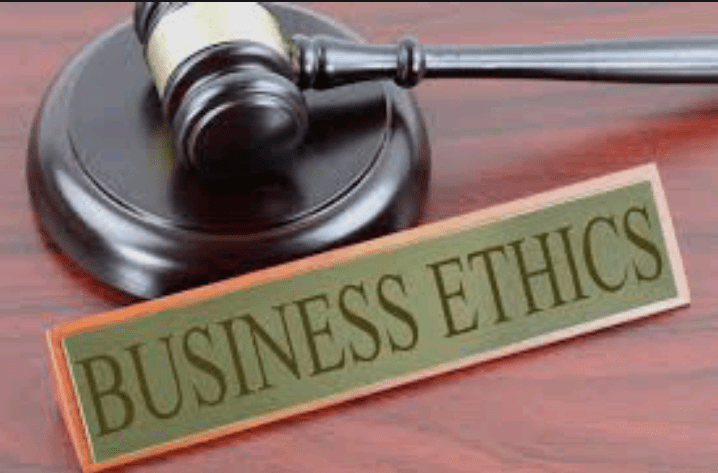To behave ethically is to behave in a manner that is consistent with what is generally considered to be right or moral. Ethical behaviour is the bedrock of mutual trust. Ultimately, the quest for organizational transformation must begin with a personal commitment within each individual to pursue moral excellence. Abraham Lincoln described the trees and reputation as shadows. Your Character is what you are; your reputation is what people think of you. Reputation is a function of perception.…… Abraham Lincoln
The ‘challenges of ethics’ are meant to be the problems of ethical values confronting business operators its relationship with the need for the development of ethical codes of conduct for organizations. Both issues are examined in this paper.
In the Soviet block, ethics took a different dimension. Marxism and socialism were used to solidify the linkage between work as an end in itself and the overall development of the society. The Japanese have work ethics that emphasizes excellence ramifications. Thus, business ethics in various places and situation derived from religious doctrine, political and economic philosophy, cultural norms and values.
The Islamic countries like Iran, Saudi Arabia and Iraq have fundamental Islamic ethics guiding their business interactions. Most countries have customs and moral values that could be used as building blocks in developing business ethical values.
Also, among the ruling elites, lack of ethics is leading to failure and collapse of multi-million dollar public corporations enterprises and contracts.
It is also believed that business ethics is not simply a philosophical concept – it is concerned with decisions. It is obviously concerned with right and wrong. This is usually relatively easy to sort out. We know it is wrong to steal or to kill.
Read Also: Concept of Marketing: Small and Big Business Marketing
More importantly, business ethics seeks answers to real life problems which often involve conflicts of “right versus right” and clashes of moral principles.
For example, if an entrepreneur confronts with a choice between bribing officials to obtain government contracts or laying off workers, what should he do? He probably realizes that paying bribes is wrong.
However, lying off workers and depriving them of their livelihood is less wrong or less moral than paying bribes?
One author defines business ethics as “the study of how personal moral norms apply to the activities and goals of commercial enterprise. It is not a separate moral standard, but the study of how the business context poses its own unique problems for the moral person who acts as an agent of this system.
Most of us would agree that it is ethics in practice that makes sense; just having it carefully drafted and redrafted in books here may not serve the purpose. Of course all of us want businesses to be fair, clean and beneficial to the society.
For that to happen, organizations need to abide by ethics or rule of law, engage themselves in fair practices and competition; all of which will benefit the consumer, the society and organization.
Primarily it is the individual, the consumer, the employee or the human social unit of the society who benefits from ethics. In addition ethics is important because of the following:
1) Satisfying Basic Human Needs: Being fair, honest and ethical is one the basic human needs. Every employee desires to be such himself and to work for an organization that is fair and ethical in its practices.
Read Also: 18 Amazing Benefits of Advertising Small Businesses
2) Creating Credibility: An organization that is believed to be driven by moral values is respected in the society even by those who may have no information about the working and the businesses or an organization.
Infosys, for example is perceived as an organization for good corporate governance and social responsibility initiatives. This perception is held far and wide even by those who do not even know what business the organization is into.
3) Uniting People and Leadership: An organization driven by values is revered by its employees also. They are the common thread that brings the employees and the decision makers on a common platform. This goes a long way in aligning behaviors within the organization towards achievement of one common goal or mission.
4) Improving Decision Making: A man’s destiny is the sum total of all the decisions that he/she takes in course of his life. The same holds true for organizations. Decisions are driven by values. For example an organization that does not value competition will be fierce in its operations aiming to wipe out its competitors and establish a monopoly in the market.
5) Long Term Gains: Organizations guided by ethics and values are profitable in the long run, though in the short run they may seem to lose money. Tata group, one of the largest business conglomerates in India was seen on the verge of decline at the beginning of 1990’s, which soon turned out to be otherwise. The same company’s Tata NANO car was predicted as a failure, and failed to do well but the same is picking up fast now.
6) Securing the Society: Often ethics succeeds law in safeguarding the society. The law machinery is often found acting as a mute spectator, unable to save the society and the environment.
Technology, for example is growing at such a fast pace that the by the time law comes up with a regulation we have a newer technology with new threats replacing the older one.
Lawyers and public interest litigations may not help a great deal but ethics can.
Ethics tries to create a sense of right and wrong in the organizations and often when the law fails, it is the ethics that may stop organizations from harming the society or environment.
In conclusion, ethics tries to create a sense of right and wrong in the organizations and often when the law fails, it is the ethics that may stop organizations from harming the society or environment.
Read Also: From Idea To Maturity: The 5 Stages Of Business Growth
